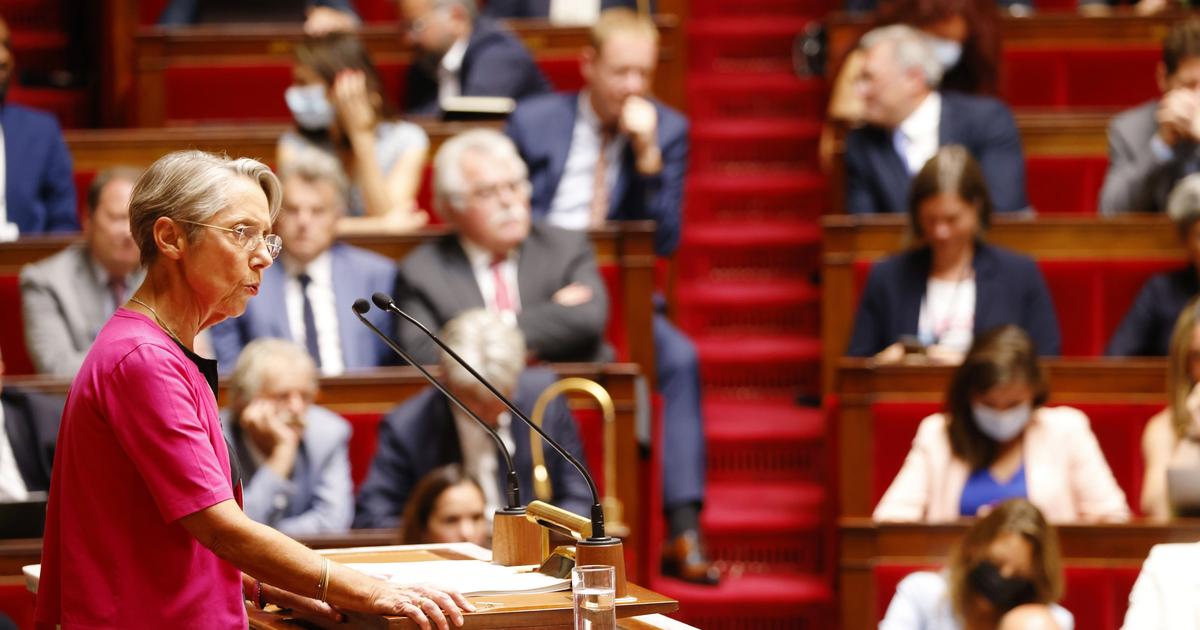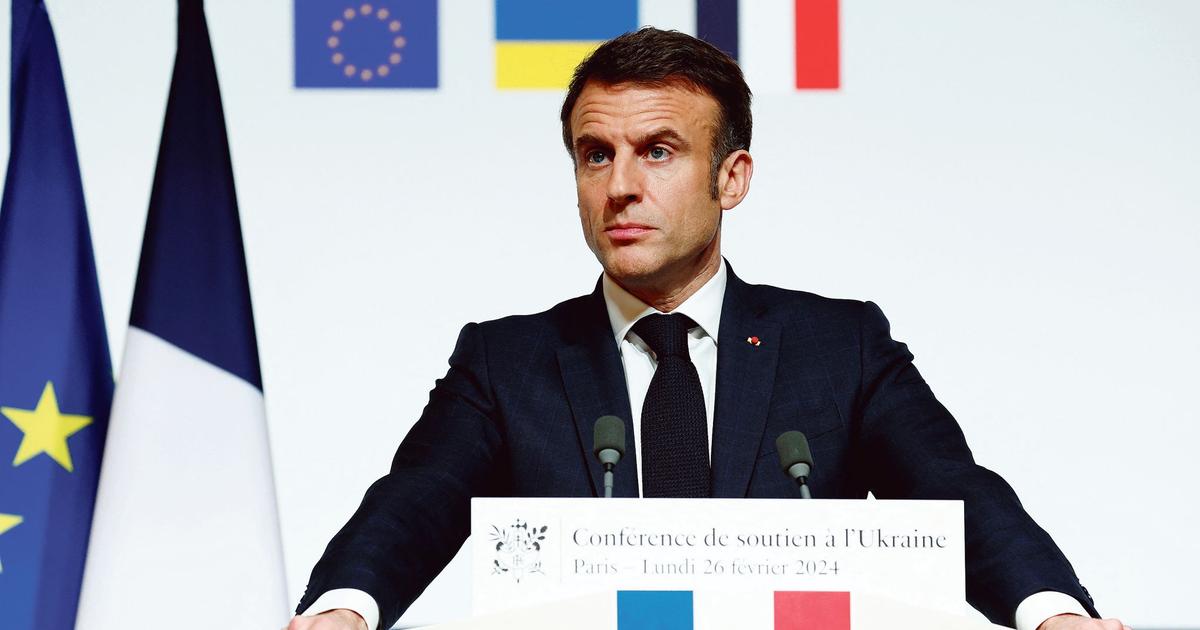Nearly two months after her appointment to Matignon, and two days after the reshuffle, Elisabeth Borne appeared at the podium of the National Assembly, this Wednesday afternoon, for her general policy speech.
Before a hemicycle with an unprecedented composition, where the executive has only a relative majority, the Prime Minister has passed her baptism of political fire.
Delimiting thus the framework of the discussions which will engage between the government and the oppositions, which the result of the legislative ones made obligatory to hope to make adopt the least text.
His speech was ultimately not followed by a vote of confidence, which risked being rejected.
But a motion of no confidence was tabled by the Nupes: the latter however has no chance of being adopted,
LIVE – Follow the latest information on Emmanuel Macron's general policy speech
Building “compromises” so that relative majority does not mean “relative action”
Avoid "
immobility
", while "
a new page in our political history is opening
".
Calling on the opposition to "
build together
" on "
each text
", Élisabeth Borne considered that "
compromise is not about compromising oneself, it is accepting everyone to take a step towards the other (...) ( without) ever breaking the thread of the dialogue
”.
“
This in no way means erasing our differences or renouncing our convictions.
(…) The time is not to count us but to talk to us
”, she pleaded, affirming that “
a relative majority is not and will not be the synonym of a relative action
', no more than '
the sign of the
Announcing "
a new page in our political and parliamentary history
", the head of government also called for more "
room for maneuver in our territories
" by carrying out "
each reform in conjunction with trade unions and employers
' organizations ".
The cross-party commission, dedicated to the future of the institutions and wanted by Emmanuel Macron, will begin "
at the start of the school year
".
"Responding to the urgency of purchasing power", the "first challenge" of the five-year term
The text must be presented Thursday in the Council of Ministers.
Faced with the deterioration of economic indicators, the executive intends to act quickly for the portfolio of the French.
"
Our first challenge is to respond to the urgency of purchasing power
", assured Élisabeth Borne, recalling that "
concrete, rapid and effective measures
" are already under study, such as the extension of the tariff shield. on gas and electricity prices, the increase
in "work income
" and the tripling of the "
purchasing power premium
".
Similarly, "
solidarity at the source
" and the regulation of access to housing - by "
capping the rise in rents
- are part of this logic.
So many promises that will be accompanied by another mantra: “
No tax increase
”.
"
We must stop believing that for each challenge the solution is a tax
", she welcomed, assuring that taxpayers and companies have seen their bills drop by "
more than 50 billion
" between 2017 and 2022.
Pensions: “We will have to work gradually a little longer”
This is one of the most divisive topics.
By addressing the ultra-sensitive issue of pension reform, Elisabeth Borne caused a first uproar within the hemicycle.
Despite the boos, coming from the left and the nationalist benches, the Prime Minister tried to explain her philosophy.
"
For the prosperity of our country and the sustainability of our pay-as-you-go system, to build new social progress, so that no pensioner with a full career has a pension of less than 1,100 euros per month, to get out of the situation where the same job does not guarantee the same retirement... Yes, we will have to work gradually a little longer
“ she said, ensuring however that no bill was already on the table.
And for good reason, she promised that the drafting of the text would be "
carried out in consultation with the social partners
", and "
by involving parliamentarians as early as possible
".
Full employment “is within reach” because “half” of the way has already been done
Emmanuel Macron made it a campaign promise.
And even a ministerial portfolio, entrusted to Olivier Dussopt.
For this second term, the executive aims to break “
the vicious circle of mass unemployment
” and access to “
full employment
”.
"
Half
" of the journey having already been made, this now presupposes "
improving working conditions
", "
working to make the professions more attractive
", "
bringing back to employment those who are the most away from the labor market
", and better support the unemployed.
In particular, the government wishes to restore “
a balance between the rights and duties
» with regard to allowances paid to job seekers.
If this objective is achieved, full employment “
will (then) create wealth
” and “
finance (a) our social model
”.
Security: double the presence of law enforcement to avoid "white zones"
Considering that "
insecurity is an inequality
", Elisabeth Borne affirms that "
there should be no white areas of security
" in France.
Hence the creation of 200 new gendarmerie brigades, and the eleven new units of mobile forces.
Hence the decision of the executive to "
double the time of presence of the police in the field by 2030 (...) thanks (to) recruitment, by simplifying procedures, by modernizing them
" .
The response to insecurity, "
is also the efficiency of justice
", she added, recalling the recruitment of 8,500 additional magistrates and justice personnel, "
for closer justice, to reduce delays and allow judges to focus on their fundamental mission
”.
The government finally promises to act so
that “every sentence pronounced is carried out
”.
A "consultation" launched in September on the "transformation of the school"
Given that “
teachers are the beating heart of the Republic
”, Élisabeth Borne believes that the government must “
better involve them in the transformation of schools
”.
The government therefore undertakes to increase their salaries and to “
build with them the evolution of their profession
”.
However, it would be "
illusory to believe that the solutions would be identical everywhere
", warned the Prime Minister, believing that "
real equality means adapting our action to local situations
".
Thus of the educational freedom already tested in about sixty establishments since the plan “Marseille in large”, and which is intended to be generalized.
“
Rooms for maneuver ”
will therefore be given to establishments “
to adapt
”, and “
the whole school community
” will be mobilized within the framework of a “
consultation
”, launched in September to “
build real equality
” at school.
Bring "radical responses" to the "climate emergency"
Faced with "
the climate emergency
", it assumes to take up "
on its own
" the concept of "
radicality
".
Claiming to want to lead “
the ecological revolution
” with “
radical answers
”, Élisabeth Borne affirmed that, “
together, we will wage the battle for the climate
”.
“
We will undertake radical transformations in the ways of producing, housing, moving, consuming
,” she said.
To achieve carbon neutrality by 2050 - the European objective - the Prime Minister outlined a "
balanced
" energy mix with "
the deployment of renewable energies
" and "
investment
" in nuclear power.
Renationalisation "100%" of EDF for more energy sovereignty
This is one of today's announcements.
In front of the deputies, Elisabeth Borne repeated her support for the nuclear sector, which should make it possible to decarbonize electricity production.
The Prime Minister thus confirmed that the government wanted to "
hold 100% of the capital of EDF
", in order to ensure France's energy sovereignty, to "
regain full control of electricity production and its performance
" and to restore financial leeway to the energy company.
New calculation of the disabled adult allowance, based on "deconjugalization"
The opposition intended to seize the examination of the bill on purchasing power to put the question on the table.
Elisabeth Borne finally took the lead.
Referring to the disabled adult allowance, the current calculation of which creates "
double dependencies
" for some concerned, the Prime Minister promised "
an in-depth reform
".
“
We will start from the principle of deconjugalization.
It is a question of dignity and a long-awaited step forward
, ”she acknowledged, confirming the “
move
” already promised by Emmanuel Macron during the campaign.
“
This creates an aberrant situation for people with disabilities
“, had recently admitted the president, while LREM had been the only party to oppose it under the previous legislature, in 2021.









